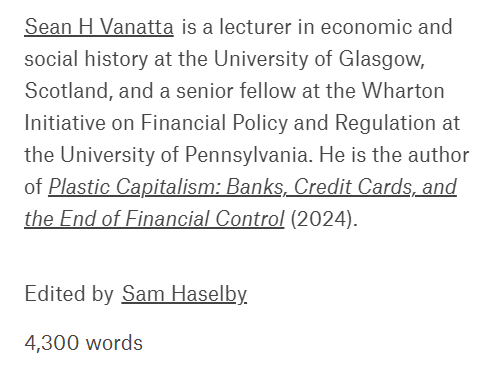Welcome to DU!
The truly grassroots left-of-center political community where regular people, not algorithms, drive the discussions and set the standards.
Join the community:
Create a free account
Support DU (and get rid of ads!):
Become a Star Member
Latest Breaking News
General Discussion
The DU Lounge
All Forums
Issue Forums
Culture Forums
Alliance Forums
Region Forums
Support Forums
Help & Search
Celerity
Celerity's Journal
Celerity's Journal
April 22, 2024

Americans have always borrowed, but how exactly did their lives become so entangled with the power of plastic cards?
https://aeon.co/essays/how-did-america-become-the-nation-of-credit-cards


The American economy has always relied on household borrowing. Since before the founding, the colonies had been ever short of metallic currency. Our 18th-century forebears substituted credit for cash. They bought goods ‘on account’, borrowing to buy time until the harvest came in or some other windfall enabled them to repay what they owed. The 19th-century shift from agriculture to industry brought many American workers predictable wages and fixed salaries. Industrial businesses – selling sewing machines, pianos, home appliances, and especially automobiles – developed novel credit arrangements to transform steady paychecks into steady repayments. Instalment credit enabled consumers to purchase expensive durable goods with a small down payment, followed by weekly or monthly payments thereafter.
In cities, department stores refined another form of borrowing: the charge account. These accounts granted affluent consumers a fixed line of credit, which they repaid monthly without paying interest. Like instalment credit, charge accounts existed to sell goods, rather than generating profits from lending as such. Charge accounts made credit convenient, encouraging consumers to buy more. Convenience came in part through a new link between credit and identification media. Stores issued charge tokens and later charge plates – fobs and metal cards that carried consumer account information – granting affluent consumers the prestige of recognition in cities full of strangers. Mass consumer credit greased the wheels of mass production. In the early 20th century, proponents praised a virtuous lending cycle. Credit generated consumer demand; which encouraged industrial investment; which led to economies of scale, lower costs, and more industrial work; finally encouraging further consumer demand.

Critics worried that consumers, having committed future income to present consumption, would have no future buying power to turn the wheel the next cycle, or the next. ‘Larger and larger doses of the stimulant must be injected merely to prevent a relapse,’ two prominent critics warned in 1926. The Great Depression ended the debate. The 1929 stock market crash stalled credit buying. Consumers worried. They waited. They postponed credit purchases – a month, two months, three. Individual delays, in the aggregate, froze the economy. Without credit purchases, factories had fewer orders. With fewer orders, factories idled and laid off workers. Unemployed workers cut spending further. They did not borrow to buy. They did not buy at all. The virtuous credit circle that turned in the 1920s shuttered and stopped in the 1930s. Policymakers took an unexpected lesson from this experience: the United States’ industrial capacity had been built to run on a steady fuel of consumer borrowing. If private lenders would not provide that fuel, New Dealers reasoned, the federal government should.

The New Deal has many conflicting legacies but, from that point forward, federal policy unambiguously supported a political economy with household borrowing at the centre. Federal lending programmes legitimised credit buying by aligning it with national economic priorities of stable employment and steady growth. Those national priorities changed course when the nation shifted from recovery to warmaking during the Second World War. Policymakers wanted consumers to save, not spend, a policy the US Federal Reserve pursued through firm controls on consumer credit. Government controls encouraged credit innovation, first to circumvent the rules, then to comply with them. Policymakers initially targeted instalment credit, which consumers used to buy durable goods like cars and home appliances. Retailers, still eager to generate sales, modified their unregulated charge account plans to enable consumers to pay over longer periods of time. Charge accounts gained the now-familiar 30-days interest-free period, with interest charged monthly on the remaining balance.
snip


Credit card nation

Americans have always borrowed, but how exactly did their lives become so entangled with the power of plastic cards?
https://aeon.co/essays/how-did-america-become-the-nation-of-credit-cards


The American economy has always relied on household borrowing. Since before the founding, the colonies had been ever short of metallic currency. Our 18th-century forebears substituted credit for cash. They bought goods ‘on account’, borrowing to buy time until the harvest came in or some other windfall enabled them to repay what they owed. The 19th-century shift from agriculture to industry brought many American workers predictable wages and fixed salaries. Industrial businesses – selling sewing machines, pianos, home appliances, and especially automobiles – developed novel credit arrangements to transform steady paychecks into steady repayments. Instalment credit enabled consumers to purchase expensive durable goods with a small down payment, followed by weekly or monthly payments thereafter.
In cities, department stores refined another form of borrowing: the charge account. These accounts granted affluent consumers a fixed line of credit, which they repaid monthly without paying interest. Like instalment credit, charge accounts existed to sell goods, rather than generating profits from lending as such. Charge accounts made credit convenient, encouraging consumers to buy more. Convenience came in part through a new link between credit and identification media. Stores issued charge tokens and later charge plates – fobs and metal cards that carried consumer account information – granting affluent consumers the prestige of recognition in cities full of strangers. Mass consumer credit greased the wheels of mass production. In the early 20th century, proponents praised a virtuous lending cycle. Credit generated consumer demand; which encouraged industrial investment; which led to economies of scale, lower costs, and more industrial work; finally encouraging further consumer demand.

Critics worried that consumers, having committed future income to present consumption, would have no future buying power to turn the wheel the next cycle, or the next. ‘Larger and larger doses of the stimulant must be injected merely to prevent a relapse,’ two prominent critics warned in 1926. The Great Depression ended the debate. The 1929 stock market crash stalled credit buying. Consumers worried. They waited. They postponed credit purchases – a month, two months, three. Individual delays, in the aggregate, froze the economy. Without credit purchases, factories had fewer orders. With fewer orders, factories idled and laid off workers. Unemployed workers cut spending further. They did not borrow to buy. They did not buy at all. The virtuous credit circle that turned in the 1920s shuttered and stopped in the 1930s. Policymakers took an unexpected lesson from this experience: the United States’ industrial capacity had been built to run on a steady fuel of consumer borrowing. If private lenders would not provide that fuel, New Dealers reasoned, the federal government should.

The New Deal has many conflicting legacies but, from that point forward, federal policy unambiguously supported a political economy with household borrowing at the centre. Federal lending programmes legitimised credit buying by aligning it with national economic priorities of stable employment and steady growth. Those national priorities changed course when the nation shifted from recovery to warmaking during the Second World War. Policymakers wanted consumers to save, not spend, a policy the US Federal Reserve pursued through firm controls on consumer credit. Government controls encouraged credit innovation, first to circumvent the rules, then to comply with them. Policymakers initially targeted instalment credit, which consumers used to buy durable goods like cars and home appliances. Retailers, still eager to generate sales, modified their unregulated charge account plans to enable consumers to pay over longer periods of time. Charge accounts gained the now-familiar 30-days interest-free period, with interest charged monthly on the remaining balance.
snip


April 22, 2024












English Teacher - This Could Be Texas (full album) 2024 (superb Leeds, UK band)
Label: Island Records – 5876414
Format: Vinyl, LP, Album, Galaxy Gold Marble CD All Media, Limited Edition
Country: UK
Released: 12 Apr 2024
Genre: Rock
Style: Alternative Rock, Post-Punk
Format: Vinyl, LP, Album, Galaxy Gold Marble CD All Media, Limited Edition
Country: UK
Released: 12 Apr 2024
Genre: Rock
Style: Alternative Rock, Post-Punk












April 22, 2024
Paste Magazine on Friday published a scathing review of Taylor Swift’s newest album, The Tortured Poets Department—but didn’t include a byline for the review’s author.
That’s because the last time it published an album review for Swift, in 2019, its journalist received a deluge of hate mail that included “threats of violence from readers who disagreed with the work,” the magazine wrote in a statement.

That onslaught, something a segment of “Swifties” have become infamous for in recent years, was apparently enough to make Paste not want to risk it happening a second time. “We care more about the safety of our staff than a name attached to an article,” the magazine said.
As for Paste’s opinion on the album itself, the it characterized it as being a “relentlessly cringe” flop that showed just how out of touch Swift is with her fans and the real world. Not long after the review published, a writer—who declared she had “nothing to do” with the piece—posted screenshots of messages she was receiving from Swifties who were adamant that she wrote the review, including one who’d baselessly called her a “loser.”
https://twitter.com/Ceilidhann/status/1781451866926178642
https://twitter.com/PasteMagazine/status/1781432759631700336
Paste Magazine Pens Taylor Swift Review Without Byline to Duck Violent Threats From Fans
https://www.thedailybeast.com/paste-magazine-publishes-t-swift-album-review-without-byline-to-duck-violent-threatsPaste Magazine on Friday published a scathing review of Taylor Swift’s newest album, The Tortured Poets Department—but didn’t include a byline for the review’s author.
That’s because the last time it published an album review for Swift, in 2019, its journalist received a deluge of hate mail that included “threats of violence from readers who disagreed with the work,” the magazine wrote in a statement.

That onslaught, something a segment of “Swifties” have become infamous for in recent years, was apparently enough to make Paste not want to risk it happening a second time. “We care more about the safety of our staff than a name attached to an article,” the magazine said.
As for Paste’s opinion on the album itself, the it characterized it as being a “relentlessly cringe” flop that showed just how out of touch Swift is with her fans and the real world. Not long after the review published, a writer—who declared she had “nothing to do” with the piece—posted screenshots of messages she was receiving from Swifties who were adamant that she wrote the review, including one who’d baselessly called her a “loser.”
https://twitter.com/Ceilidhann/status/1781451866926178642
https://twitter.com/PasteMagazine/status/1781432759631700336
April 22, 2024

Sabreen was dead before she could look into the baby's eyes or hold her.
https://www.bbc.com/news/world-middle-east-68874070

The young mother had carried her child through seven-and-a-half months of pregnancy. They were days and nights of constant fear, but Sabreen hoped the family's luck would hold until the war ended. That luck vanished in the roar and fire of an explosion in the hour before midnight on 20 April.

The Israelis dropped a bomb onto the al-Sakani family home in Rafah where Sabreen, along with her husband and the couple's other daughter - three-year-old Malak - were asleep. Sabreen suffered extensive injuries and her husband and Malak were killed, but the baby was still alive in her mother's womb when rescue workers reached the site. They rushed Sabreen to hospital, where doctors performed an emergency caesarean section to deliver the child.

Sabreen could not be saved but doctors worked to resuscitate the baby, gently tapping her chest to stimulate breathing. Air was pumped into her lungs. "She was born in severe respiratory distress," said Dr Mohammed Salama, head of the emergency neo-natal unit at Emirati Hospital in Rafah.

But the baby - who weighed just 1.4kg (3.1 lbs) - survived the ordeal of her birth. The doctor wrote the words "the baby of the martyr Sabreen al-Sakani" on a piece of tape and attached it to her body. She was then placed in an incubator. "We can say there is some progress in her health condition," Dr Salama said. "But the situation is still at risk. This respiratory distress syndrome is originally caused by premature birth. This child should have been in the mother's womb at this time, but she was deprived of this right."
snip

A Palestinian doctor tends to a baby born prematurely after her mother was fatally wounded by an Israeli airstrike in Rafah, Gaza Strip, at the Kuwaiti Hospital in Rafah, April 20, 2024. AFP/GETTY
Israel-Gaza: Baby saved from dead mother's womb after Israeli strike in Rafah

Sabreen was dead before she could look into the baby's eyes or hold her.
https://www.bbc.com/news/world-middle-east-68874070

The young mother had carried her child through seven-and-a-half months of pregnancy. They were days and nights of constant fear, but Sabreen hoped the family's luck would hold until the war ended. That luck vanished in the roar and fire of an explosion in the hour before midnight on 20 April.

The Israelis dropped a bomb onto the al-Sakani family home in Rafah where Sabreen, along with her husband and the couple's other daughter - three-year-old Malak - were asleep. Sabreen suffered extensive injuries and her husband and Malak were killed, but the baby was still alive in her mother's womb when rescue workers reached the site. They rushed Sabreen to hospital, where doctors performed an emergency caesarean section to deliver the child.

Sabreen could not be saved but doctors worked to resuscitate the baby, gently tapping her chest to stimulate breathing. Air was pumped into her lungs. "She was born in severe respiratory distress," said Dr Mohammed Salama, head of the emergency neo-natal unit at Emirati Hospital in Rafah.

But the baby - who weighed just 1.4kg (3.1 lbs) - survived the ordeal of her birth. The doctor wrote the words "the baby of the martyr Sabreen al-Sakani" on a piece of tape and attached it to her body. She was then placed in an incubator. "We can say there is some progress in her health condition," Dr Salama said. "But the situation is still at risk. This respiratory distress syndrome is originally caused by premature birth. This child should have been in the mother's womb at this time, but she was deprived of this right."
snip

A Palestinian doctor tends to a baby born prematurely after her mother was fatally wounded by an Israeli airstrike in Rafah, Gaza Strip, at the Kuwaiti Hospital in Rafah, April 20, 2024. AFP/GETTY
April 22, 2024
https://www.thedailybeast.com/trumps-a-fraud-when-it-comes-to-law-and-order-and-backing-the-blue

Donald Trump likes to project himself on the campaign trail as a tough, “law and order” president who always “backs the blue.” At nearly every campaign stop, his advance team arranges for law enforcement photo ops, and a central part of his campaign message is that he wants the law strictly enforced and is always on the side of the police. After NYPD officer Jonathan Diller was shot and killed in the line of duty last month, Trump scrambled a flight from Florida up to New York City to attend the slain officer’s memorial service. His campaign arranged for Diller’s family to pose for pictures with the ex-president, while Trump complained that violence against police officers is “happening all too often and we’re just not going to let it happen.”
https://twitter.com/kleavittnh/status/1778145766415925724
However, many of Trump’s actions as president—and many that he promises to make should he win the election in November—directly contradict his manufactured pro-cop image. His initial budget in 2017 sought dramatic cuts in funding for community policing and federal grants used to train and equip local police agencies. His final three budgets sought to either cut these programs in half or eliminate them entirely. When Congress continued to fund these programs, Trump’s DOJ refused to release millions in funding to police agencies that he determined weren’t tough enough on immigration.
As president, Trump pardoned 237 people convicted of federal crimes, but bypassed procedures that had been in place for 125 years to ensure pardons were fair and appropriate based on the facts and circumstances. Under past presidents, the Justice Department’s Office of Pardons reviewed each application for suitability. Trump ended that practice, bypassing DOJ to dole out pardons to his friends, political supporters, and people with well-connected friends—such as Roger Stone, Michael Flynn, Steve Bannon, Dinesh D’Souza, Paul Manafort, Michael Milken, Bernard Kerik, Charles Kushner, and George Papadopoulos.
Trump also granted pardons to seven former Republican congressmen, whose alleged crimes included insider trading, conspiracy, wire and mail fraud, bribery, money laundering, extortion, insurance fraud, and tax evasion. (Trump’s “law and order” apparently doesn’t apply to Republican politicians, either.) Only 25 of Trump’s 237 pardons were recommended by DOJ. But if there’s one aspect of Trump’s 2024 campaign that proves beyond a doubt that his “backing the blue” pose is a fraud—it’s his repeated promises to pardon defendants charged with crimes related to the Jan. 6, 2021, assault on the U.S. Capitol that he incited. He’s called the insurrectionists “patriots” who have been “treated very unfairly.” He has never added any limiting or qualifying language to his pledge to set the “Jan. 6 hostages” free, so voters must assume he means all of them.
snip
Trump's a Fraud When It Comes to Law and Order and 'Backing the Blue'
He pardoned crony crooks against DOJ’s recommendations, and he’s promised to let Jan. 6 insurrectionists—who brutally attacked cops—off the hook.https://www.thedailybeast.com/trumps-a-fraud-when-it-comes-to-law-and-order-and-backing-the-blue

Donald Trump likes to project himself on the campaign trail as a tough, “law and order” president who always “backs the blue.” At nearly every campaign stop, his advance team arranges for law enforcement photo ops, and a central part of his campaign message is that he wants the law strictly enforced and is always on the side of the police. After NYPD officer Jonathan Diller was shot and killed in the line of duty last month, Trump scrambled a flight from Florida up to New York City to attend the slain officer’s memorial service. His campaign arranged for Diller’s family to pose for pictures with the ex-president, while Trump complained that violence against police officers is “happening all too often and we’re just not going to let it happen.”
https://twitter.com/kleavittnh/status/1778145766415925724
However, many of Trump’s actions as president—and many that he promises to make should he win the election in November—directly contradict his manufactured pro-cop image. His initial budget in 2017 sought dramatic cuts in funding for community policing and federal grants used to train and equip local police agencies. His final three budgets sought to either cut these programs in half or eliminate them entirely. When Congress continued to fund these programs, Trump’s DOJ refused to release millions in funding to police agencies that he determined weren’t tough enough on immigration.
As president, Trump pardoned 237 people convicted of federal crimes, but bypassed procedures that had been in place for 125 years to ensure pardons were fair and appropriate based on the facts and circumstances. Under past presidents, the Justice Department’s Office of Pardons reviewed each application for suitability. Trump ended that practice, bypassing DOJ to dole out pardons to his friends, political supporters, and people with well-connected friends—such as Roger Stone, Michael Flynn, Steve Bannon, Dinesh D’Souza, Paul Manafort, Michael Milken, Bernard Kerik, Charles Kushner, and George Papadopoulos.
Trump also granted pardons to seven former Republican congressmen, whose alleged crimes included insider trading, conspiracy, wire and mail fraud, bribery, money laundering, extortion, insurance fraud, and tax evasion. (Trump’s “law and order” apparently doesn’t apply to Republican politicians, either.) Only 25 of Trump’s 237 pardons were recommended by DOJ. But if there’s one aspect of Trump’s 2024 campaign that proves beyond a doubt that his “backing the blue” pose is a fraud—it’s his repeated promises to pardon defendants charged with crimes related to the Jan. 6, 2021, assault on the U.S. Capitol that he incited. He’s called the insurrectionists “patriots” who have been “treated very unfairly.” He has never added any limiting or qualifying language to his pledge to set the “Jan. 6 hostages” free, so voters must assume he means all of them.
snip
April 22, 2024
fuck Newsweek and fuck The Daily Mail, please, please stop giving those RW shitrags exposure and clicks
So bloody sick of them being posted left, right, and centre here. ![]()
April 22, 2024

https://variety.com/2024/music/news/spotify-300-million-streams-tortured-poets-department-taylor-swift-1235977306/

Taylor Swift can’t quit breaking her own records. After Spotify revealed Friday that “The Tortured Poets Department” had become the first album in the DSP’s history to amass 200 million streams in a single day, the service updated that news early Saturday, to report that first-day streams actually surpassed 300 million, when all was said and done and counted.
“History made!” the company tweeted. “On April 19, 2024, Taylor Swift’s The Tortured Poets Department was the first album in Spotify history to have over 300M streams in a single day.” On top of that, “Fortnight,” the album’s Post Malone-featuring first single, set the record as the platform’s most-streamed song in a single day, topping Adele’s “Easy on Me” (set in 2021)
https://twitter.com/Spotify/status/1781694331482714177
It did not hurt in racking up these numbers that, just two hours after “The Tortured Poets Department” came out at the stroke of midnight ET, Swift announced to her sleepy fans that she was adding 15 tracks to the previously existing 16 for a 31-song deluxe digital edition. Before the new album came out, Swift previously held the record for most streams in a single day, with the previous benchmarks set by 2022’s “Midnights” and 2023’s “1989 (Taylor’s Version).”
https://twitter.com/Spotify/status/1781668213807620117
It had already been reported Friday that with “Poets,” Swift had become the most streamed artist in a single day in Spotify history. She previously broke her record as the most streamed artist in a single day when “1989 (Taylor’s Version)” dropped in October last year. Before the album release, she had already set a slightly more mundane record, as “Poets” became the most pre-saved album on the Countdown Page in Spotify history just a day before it arrived.
snip
Taylor Swift's Record-Breaking First Day at Spotify With 'Tortured Poets' Surpassed 300 Million Streams

https://variety.com/2024/music/news/spotify-300-million-streams-tortured-poets-department-taylor-swift-1235977306/

Taylor Swift can’t quit breaking her own records. After Spotify revealed Friday that “The Tortured Poets Department” had become the first album in the DSP’s history to amass 200 million streams in a single day, the service updated that news early Saturday, to report that first-day streams actually surpassed 300 million, when all was said and done and counted.
Taylor Swift - Cassandra (Official Lyric Video)
They knew, they knew, they knew the whole time
That I was onto somethin'
The family, the pure greed, the Christian chorus line
They all said nothin'
Blood's thick, but nothin' like a payroll
Bet they never spared a prayer for my soul
They knew, they knew, they knew the whole time
That I was onto somethin'
The family, the pure greed, the Christian chorus line
They all said nothin'
Blood's thick, but nothin' like a payroll
Bet they never spared a prayer for my soul
“History made!” the company tweeted. “On April 19, 2024, Taylor Swift’s The Tortured Poets Department was the first album in Spotify history to have over 300M streams in a single day.” On top of that, “Fortnight,” the album’s Post Malone-featuring first single, set the record as the platform’s most-streamed song in a single day, topping Adele’s “Easy on Me” (set in 2021)
https://twitter.com/Spotify/status/1781694331482714177
It did not hurt in racking up these numbers that, just two hours after “The Tortured Poets Department” came out at the stroke of midnight ET, Swift announced to her sleepy fans that she was adding 15 tracks to the previously existing 16 for a 31-song deluxe digital edition. Before the new album came out, Swift previously held the record for most streams in a single day, with the previous benchmarks set by 2022’s “Midnights” and 2023’s “1989 (Taylor’s Version).”
https://twitter.com/Spotify/status/1781668213807620117
It had already been reported Friday that with “Poets,” Swift had become the most streamed artist in a single day in Spotify history. She previously broke her record as the most streamed artist in a single day when “1989 (Taylor’s Version)” dropped in October last year. Before the album release, she had already set a slightly more mundane record, as “Poets” became the most pre-saved album on the Countdown Page in Spotify history just a day before it arrived.
snip
April 22, 2024

https://www.washingtonpost.com/opinions/2024/04/22/johnson-military-aid-damage-ukraine/
https://archive.ph/Vxty9

Debris from apartments hit by a Russian missile in Kharkiv, Ukraine, on Jan. 23. (Alice Martins for The Washington Post)
Rep. Jim McGovern (D-Mass.) put it well:
https://twitter.com/DNCWarRoom/status/1781336247853592601
When the vote on Ukraine aid finally came, it was overwhelming, 311-112. That raised the question: Why in the world did such a popular measure take so long? It could have been done long ago, when President Biden requested the aid in October, had Johnson simply ignored the histrionics from pro-Putin House members who take their cues from Donald Trump. A week … a month … six months ago, the vote to deliver critical aid could have prevented countless Ukrainian deaths. Just last week, Russian missiles struck an apartment building in the northern Ukrainian city of Chernihiv, killing 17 people and injuring at least 61. That was merely one strike among many Russia has successfully carried out in recent months while Ukraine has been hampered by munitions shortages and inadequate antimissile defenses.
The delay had serious, widespread consequences for Ukraine. Max Bergmann, a former State Department official and director of the Europe, Russia and Eurasia program for the Center for Strategic and International Studies, tells me, “Their power sector has been decimated by lack of air defense, which will be incredibly costly to repair.” He adds that on the front “Ukrainians have lost a lot of soldiers because if you don’t have artillery you have to hold the line with men.” In other words, Ukraine has “lost a lot of people simply because we stopped providing them ammo.”
Amnesty International, tracking one of Russia’s many ongoing human rights violations, reported just days before the vote, “In what may be cumulatively one of Russia’s most destructive series of strikes on Ukraine’s energy infrastructure, several power facilities were attacked, resulting in further suffering and disruption to Ukrainian civilians.” The organization noted, “Deliberately attacking civilian infrastructure, such as power stations and electricity supplies, and causing overwhelming harm to civilians is a violation of international humanitarian law.” Count that among the consequences of delayed U.S. aid. The shortages of ammunition and antimissile systems for Ukraine meant Russia paid little price for continued aggression......................
snip
Jennifer Rubin: Forget the ticker-tape parade. Mike Johnson is no hero.

https://www.washingtonpost.com/opinions/2024/04/22/johnson-military-aid-damage-ukraine/
https://archive.ph/Vxty9

Debris from apartments hit by a Russian missile in Kharkiv, Ukraine, on Jan. 23. (Alice Martins for The Washington Post)
Foreign policy commentators and proponents of aid to Ukraine spent days gushing over House Speaker Mike Johnson (R-La.) for finally bringing to the floor a bill for aid to Israel, Ukraine and Taiwan. Give him credit! He came around! What courage! That praise ignored the immense damage that Johnson and MAGA House Republican pro-Russia propagandists inflicted on America’s beleaguered Ukrainian allies.
https://twitter.com/MEPFuller/status/1780747674355966331
https://twitter.com/WSJopinion/status/1781130635513364918
https://twitter.com/MEPFuller/status/1780747674355966331
https://twitter.com/WSJopinion/status/1781130635513364918
Rep. Jim McGovern (D-Mass.) put it well:
https://twitter.com/DNCWarRoom/status/1781336247853592601
When the vote on Ukraine aid finally came, it was overwhelming, 311-112. That raised the question: Why in the world did such a popular measure take so long? It could have been done long ago, when President Biden requested the aid in October, had Johnson simply ignored the histrionics from pro-Putin House members who take their cues from Donald Trump. A week … a month … six months ago, the vote to deliver critical aid could have prevented countless Ukrainian deaths. Just last week, Russian missiles struck an apartment building in the northern Ukrainian city of Chernihiv, killing 17 people and injuring at least 61. That was merely one strike among many Russia has successfully carried out in recent months while Ukraine has been hampered by munitions shortages and inadequate antimissile defenses.
The delay had serious, widespread consequences for Ukraine. Max Bergmann, a former State Department official and director of the Europe, Russia and Eurasia program for the Center for Strategic and International Studies, tells me, “Their power sector has been decimated by lack of air defense, which will be incredibly costly to repair.” He adds that on the front “Ukrainians have lost a lot of soldiers because if you don’t have artillery you have to hold the line with men.” In other words, Ukraine has “lost a lot of people simply because we stopped providing them ammo.”
Amnesty International, tracking one of Russia’s many ongoing human rights violations, reported just days before the vote, “In what may be cumulatively one of Russia’s most destructive series of strikes on Ukraine’s energy infrastructure, several power facilities were attacked, resulting in further suffering and disruption to Ukrainian civilians.” The organization noted, “Deliberately attacking civilian infrastructure, such as power stations and electricity supplies, and causing overwhelming harm to civilians is a violation of international humanitarian law.” Count that among the consequences of delayed U.S. aid. The shortages of ammunition and antimissile systems for Ukraine meant Russia paid little price for continued aggression......................
snip
April 22, 2024

Fears over late-night revellers causing excessive noise are leading to the city council’s clampdown on takeaway food and drink
https://www.thetimes.co.uk/article/milan-bans-ice-cream-after-midnight-q0qkj7hfb
https://archive.ph/MjEMl

Milan is poised to ban sales of ice creams after midnight in ongoing efforts to clamp down on nighttime revellers sowing havoc on the streets of Italy’s financial capital. The new rules devised by the city council will ban the sale of takeaway drinks and food, including pizza and ice cream, in 12 of Milan’s liveliest districts. “We are seeking a balance between sociality and entertainment, the peace and health of the residents and the free economic activity of traders and entrepreneurs,” Marco Granelli, the deputy mayor responsible for security, wrote on Facebook.
Home to Italy’s banking and technology sectors as well as the country’s stock exchange, Milan has a reputation for its tireless workforce and is credited with inventing Italy’s after-work aperitivo. According to a 2023 study by the market research company NIQ, the city is home to nearly 12,500 bars and restaurants. Now the council is determined to clamp down on drinkers gathering on the city’s streets after hours. “A sizable segment of the population is complaining about excessive noise,” Giuseppe Sala, the mayor, told reporters last month. “In my role I have to listen to all citizens, including those who have to work and those who want to do their business.”
The measure, which is due to come into force on May 7 and will run until early November, will apply to areas including Navigli, where crowds gather outside bars lining two narrow canals, and Paolo Sarpi, or Chinatown, which is home to a growing number of edgy fusion cocktail bars. While the new regulation applies to all kinds of takeaway food, critics have particularly rallied behind gelaterias, which are accustomed to serving late-night customers as an inherent part of Italian culture. The right-wing newspaper Il Giornale claimed Sala had “declared war on ice cream”.

Business representatives have criticised the plans. “This initiative does not solve the problem,” Lino Stoppani, president of the Italian federation of public and tourist operators, told newspaper Il Messaggero. He added that the measure would “damage businesses that generate wealth”. The ban will apply to takeaways from midnight every day and to outdoor tables from 12.30am on weekdays and from 1.30am on Saturdays, Sundays and public holidays. Citizens and private and public stakeholders have until early May to file suggested changes to the plan. Milan backtracked on plans to introduce a similar ban in 2013, when Giuliano Pisapia, the mayor at the time, claimed there had been a “misunderstanding”. “Milanese residents can continue to freely enjoy an ice cream after midnight,” he said at the time.
snip

Milan bans ice cream after midnight

Fears over late-night revellers causing excessive noise are leading to the city council’s clampdown on takeaway food and drink
https://www.thetimes.co.uk/article/milan-bans-ice-cream-after-midnight-q0qkj7hfb
https://archive.ph/MjEMl

Milan is poised to ban sales of ice creams after midnight in ongoing efforts to clamp down on nighttime revellers sowing havoc on the streets of Italy’s financial capital. The new rules devised by the city council will ban the sale of takeaway drinks and food, including pizza and ice cream, in 12 of Milan’s liveliest districts. “We are seeking a balance between sociality and entertainment, the peace and health of the residents and the free economic activity of traders and entrepreneurs,” Marco Granelli, the deputy mayor responsible for security, wrote on Facebook.
Home to Italy’s banking and technology sectors as well as the country’s stock exchange, Milan has a reputation for its tireless workforce and is credited with inventing Italy’s after-work aperitivo. According to a 2023 study by the market research company NIQ, the city is home to nearly 12,500 bars and restaurants. Now the council is determined to clamp down on drinkers gathering on the city’s streets after hours. “A sizable segment of the population is complaining about excessive noise,” Giuseppe Sala, the mayor, told reporters last month. “In my role I have to listen to all citizens, including those who have to work and those who want to do their business.”
The measure, which is due to come into force on May 7 and will run until early November, will apply to areas including Navigli, where crowds gather outside bars lining two narrow canals, and Paolo Sarpi, or Chinatown, which is home to a growing number of edgy fusion cocktail bars. While the new regulation applies to all kinds of takeaway food, critics have particularly rallied behind gelaterias, which are accustomed to serving late-night customers as an inherent part of Italian culture. The right-wing newspaper Il Giornale claimed Sala had “declared war on ice cream”.

Business representatives have criticised the plans. “This initiative does not solve the problem,” Lino Stoppani, president of the Italian federation of public and tourist operators, told newspaper Il Messaggero. He added that the measure would “damage businesses that generate wealth”. The ban will apply to takeaways from midnight every day and to outdoor tables from 12.30am on weekdays and from 1.30am on Saturdays, Sundays and public holidays. Citizens and private and public stakeholders have until early May to file suggested changes to the plan. Milan backtracked on plans to introduce a similar ban in 2013, when Giuliano Pisapia, the mayor at the time, claimed there had been a “misunderstanding”. “Milanese residents can continue to freely enjoy an ice cream after midnight,” he said at the time.
snip
April 22, 2024

The political scientist Eunice Goes explains to Robin Wilson the vicissitudes of social democracy historically and addresses its contemporary challenges.
https://www.socialeurope.eu/social-democracy-its-history-and-its-future

The Great Chartist Meeting on Kennington Common in 1848—Marx was impressed with this working-class movement for voting rights in Britain, albeit only for men
snip
Social democracy: its history and its future

The political scientist Eunice Goes explains to Robin Wilson the vicissitudes of social democracy historically and addresses its contemporary challenges.
https://www.socialeurope.eu/social-democracy-its-history-and-its-future

The Great Chartist Meeting on Kennington Common in 1848—Marx was impressed with this working-class movement for voting rights in Britain, albeit only for men
Robin Wilson: Your new book, Social Democracy, is a sobering account of social democracy since its emergence, charting a steadily diminishing political ambition—a fading of the red flag, if you like—over time. In your telling, in the latter 19th century, social democracy forsook the ill-defined ‘revolution’ of Marx and Engels for a parliamentary road to socialism. In the early 20th century, it demarcated itself from purportedly radical yet authoritarian alternatives. In the later 20th century, it accommodated to neoliberal capitalism. And in this century, it became disorientated by the ‘polycrisis’. Why do you think there was this steady trajectory, rather than more back-and-forth—more moments of social democratic achievement to record, such as the universal welfare states established in the Nordic countries in the middle of the last century?
Eunice Goes: That was the result of different things operating at the same time—and there was a bit of back and forth, which was not so steady. There was always an element of contingency and reacting to events as they emerged. But the first factor that drove this social democratic backsliding—if we can talk about it in those terms—has to do with when theory gets into contact with the messy reality of politics. And this is something we all experience in our lives: before we parent, we read about how to look after children and then, once our children are presented before us, we are faced with completely new sets of situations and have to improvise. In the late 19th century one thing was the theory of social democracy, the way the theorists imagined a socialist society.
Then they got on to start to implement that social-democratic society but reality is always different from the theory. And the first adaptation had to do with the electoral ground on which they were going to bring their vision to fruition. They very quickly saw—and Marx and Engels were the first to argue it—that parliamentary democracy and universal suffrage offered them an incredible tool to bring that vision of society about. But again, how they imagined their electorate, and in particular the working class or the supporters of the labour movement, was quite different from the voters they encountered on the ground. And so if the road to power was through elections—was through the parliamentary road—they had to adapt to these new voters. These voters might have been quite sympathetic to the cause of social democracy—they might have been very supportive. But they were not militants and they were not dogmatic followers of theory.
So if parties wanted to win elections, they needed to adjust to that reality. They also had to adjust to the fact that in many countries the industrial working class was not a majority. So if they wanted to be in power and to start to transform society, they needed to make proposals that offered something to those other voters. Finally, the trajectory of social democracy was also one of struggle. They had to deal with a fairly hostile environment. It was not just the difficulty of winning elections—it was the difficulty of dealing with a series of institutions in the societies in which they were operating that were quite hostile to a socialist project: judicial systems, the law, the media, of course, mostly privately owned. So socialists had to fight, they had to deal with and adapt to those situations. This over 160 years of history has been one of struggle and one where social-democratic parties with the exception of Scandinavia have been mostly in opposition. Very few times have social-democratic parties governed in the countries in which they are operating.
Then they got on to start to implement that social-democratic society but reality is always different from the theory. And the first adaptation had to do with the electoral ground on which they were going to bring their vision to fruition. They very quickly saw—and Marx and Engels were the first to argue it—that parliamentary democracy and universal suffrage offered them an incredible tool to bring that vision of society about. But again, how they imagined their electorate, and in particular the working class or the supporters of the labour movement, was quite different from the voters they encountered on the ground. And so if the road to power was through elections—was through the parliamentary road—they had to adapt to these new voters. These voters might have been quite sympathetic to the cause of social democracy—they might have been very supportive. But they were not militants and they were not dogmatic followers of theory.
So if parties wanted to win elections, they needed to adjust to that reality. They also had to adjust to the fact that in many countries the industrial working class was not a majority. So if they wanted to be in power and to start to transform society, they needed to make proposals that offered something to those other voters. Finally, the trajectory of social democracy was also one of struggle. They had to deal with a fairly hostile environment. It was not just the difficulty of winning elections—it was the difficulty of dealing with a series of institutions in the societies in which they were operating that were quite hostile to a socialist project: judicial systems, the law, the media, of course, mostly privately owned. So socialists had to fight, they had to deal with and adapt to those situations. This over 160 years of history has been one of struggle and one where social-democratic parties with the exception of Scandinavia have been mostly in opposition. Very few times have social-democratic parties governed in the countries in which they are operating.
snip
Profile Information
Gender: FemaleHometown: London
Home country: US/UK/Sweden
Current location: Stockholm, Sweden
Member since: Sun Jul 1, 2018, 07:25 PM
Number of posts: 43,306




